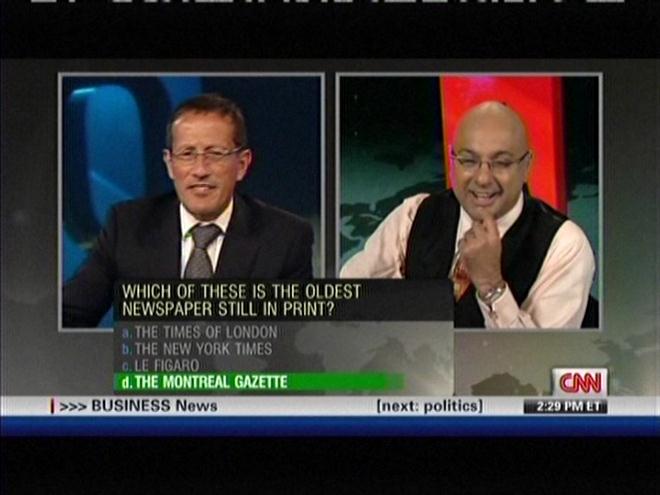The city shut down The Fresh Fruit Company at the Byward Market for non-payment of rent. But what about all the food still in the store that is now left there rotting?
Now this is one stunning picture, taken from the ISS of the plasma trail of Atlantis during the spacecraft’s fiery descent into the atmosphere:
Human memory is far from perfect.
During the winter of 1988-1989, I was renting a small office on Ottawa’s Bank Street with my business partner John. We spent many a late night working on a difficult project, and it was one cold winter. I distinctly remember one night when the temperature dipped to −36 degrees Centigrade, and I not only had a hard time starting my car (only to rush back to the building to warm up and then run out to the car again after a few minutes in the hope that it would have warmed up a little by then) but its engine never reached its normal operating temperature during the 10 km drive home.
Except that it never happened. The -36°C, that is. The coldest historical temperature I can find for that winter is −27.2°C, which occurred in early March 1989; earlier, in January, it went down to −27.0°C one night.
I also distinctly remember that the first winter my wife spent here in Ottawa, she was renting a stall on the Byward Market and that on Christmas Eve day, the temperature never climbed above −24°C.
Again, never happened. On December 24, 1992, the high temperature was +2.7°C. Perhaps a year later, then? Yes, that was a cold Christmas Eve day, but not near that cold; the high temperature was -10.0°C.
Then there is that very cold winter in Budapest that I recall. It was brutal; my old Lada’s engine half froze. Eventually I managed to get it running without overheating, and then I spent half the night looking for a gas station that was selling antifreeze. Eventually I found one, way outside of Budapest. I do recall hearing on the radio that the temperature was -29°C. It wasn’t… according to the historical weather records that I can locate, the coldest night was on February 12, 1985, with a temperature of −24°C. Brutally cold by Budapest standards to be sure, but still 5 degrees warmer than what I remember.
At least I do know for a fact that today, the temperature reached +36°C. I think I owe an extra prayer of thanks to the gods of air conditioning.
RadioAstron, aka Spectrum-R, is in orbit. If it successfully opens its 10-meter dish antenna a few days from now, it will join the list of great space-based telescopes. It also signals that Russia is still a strong space-capable nation, doing much more than cheaply ferrying foreign astronauts to the International Space Station, filling the gap left behind by the retirement of the Shuttle program.
Tomorrow will be the 42nd anniversary of Armstrong’s “One small step”. How many years do we need to wait for the next small step taken by a human, be it in the dust of the Moon, the red rocks of Mars, or the cold surface of an asteroid?
I found out that I am less squeamish than I thought.
I went out for a walk this morning, and in the middle of a sidewalk, I suddenly spotted a mouse. First I thought it was a small furry mouse toy, as it looked like a perfect little mouse, completely motionless. But then I realized it was the real thing, probably dead… but no, wait, it was still kicking. When I touched it with the toe of my shoe, it squeaked loudly and tried to crawl away… but even though I was trying to steer it towards the grass with my shoe, it didn’t get very far. I think it was badly injured, probably a broken leg or something. Eventually, fears of hantavirus and whatnot notwithstanding, I just grabbed it by the tail (loud squeaks followed) and threw it in the grass.
I mean, what was I supposed to do, step on the poor thing? Yes, I know, too much empathy is bad for your health, but apart from their size, mice are not that different from other mammals… they have hearts, lungs, a sizable brain, and the ability to feel fear and pain. In all likelihood, this poor critter has since been found by a cat, but at least it’s not expiring in the middle of a sidewalk half crushed to death when someone steps on it.
Yes, I avoided touching my face afterwards and washed my hands as soon as I got back home.
Last night, my wife and I watched Barney’s Version on Blu-ray. I really loved Mordecai Richler’s novel, and the movie is true to its spirit; it is, in fact, a remarkable well done film. Too bad it didn’t do particularly well in the box office; it deserved better.
Our paper on the analysis of extended Pioneer 10 and 11 Doppler data was just accepted by Physical Review Letters.
In it, we report that a data set roughly twice in size the data set that was analyzed previously continues to support the notion that a small anomalous acceleration is affecting both spacecraft. However, there is no reason to believe that the acceleration is in the direction of the Sun or that it is constant; on the contrary, the data seem to favor (albeit weakly) an Earth-directed, temporally decaying acceleration model.
Heat, emitted anisotropically, remains the prime suspect. The observed decrease in the acceleration appears more rapid than the rate of decay of the radioactive fuel on board. This is explained once we consider that much of the thermal acceleration would be due to electrically produced heat, and the amount of electricity available on board decreases much more rapidly. (The reason is that as the plutonium fuel cools, the thermocouples used to generate electricity become less efficient; the thermocouples also age.)
We also looked at some early data, taken when Pioneer 11 was cruising between Jupiter and Saturn. The possibility that the anomalous acceleration only began after Pioneer 10 and 11 passed the orbit of Saturn was much discussed in the literature. While we cannot exclude such an onset, its presence cannot be confirmed either (the early data is just too short in duration for a definitive conclusion). In any case, the shape of the onset curve very strongly suggests that it is, in fact, a modeling artifact: it is precisely what one would see if the Pioneer spacecraft’s solar pressure model was miscalibrated, which is a very likely possibility.
In the past few years, we also constructed a detailed thermal model of the Pioneer spacecraft, using recovered documentation and telemetry. We are busy preparing another report in which the results of this effort will be discussed.
In Austria, it is now legal to wear a spaghetti strainer on your head while being photographed for your driver’s license, so long as it is worn as the religious symbol for Pastafarianism. Yay!
I was trying to resolve a tricky problem today with the domain name system on one of my servers. One possibility was that a broken root server might have been responsible for the faulty behavior. So I began reading about broken root servers. Reading up on this topic, I happened upon an article published a few years ago discussing the pros and cons of internationalizing the Internet’s numbering authority. So I went to Wikipedia to read up about the current status of ICANN. This led me to another article about the proposed Interplanetary Internet, and about delay-tolerant networking in general. Soon I found myself reading a variety of articles on the history of computing, including the legendary decline of once famous companies like Data General and Digital… and eventually, after reading about early computer architectures and calculators, I was staring at an article discussing the early inventions of Hero of Alexandria, who indeed had a steam reaction engine and another invention that used expanding hot air to displace water which then opened church doors, two inventions that are often confused these days, leading many to believe that Hero’s engine was capable of useful work.
Unfortunately, I am not capable of useful work when I get lost like this on Wikipedia. My problem with DNS remains unsolved.
Today, I received a phone call from 1-510-943-3040.
A gentleman with an Asian accent informed me that he is from the MS Windows Service Department (or whatever) and that in the last 30 days, they received repeat warnings from my computer about some malware attack.
I played along for a minute or two… but when the gentleman asked me to turn on my computer, I just couldn’t any longer. Still holding back my anger, I first explained to him that right now I am staring at a bookshelf containing a number of books I wrote about C++ and Windows programming; that I’ve been a computer professional since the 1970s (true, I received my first professional contract at the tender age of 16 in 1979)… and then, in language more rude I am afraid, I also told him that they are nothing but crooks and criminals, and that he should get off my f…ing phone.
The insolence!
Back when I was a high school student in Hungary in the late 1970s, someone gave me a poster of the yet-to-be-tested American space vehicle, the Space Shuttle. This picture stayed on my wall, right above my desk, for many years. Every time I looked at it, I couldn’t help but feel amazed: a space plane the size of a passenger aircraft, flying to orbit and back like there was nothing to it. Now that’s the American space program!
That, of course, was before Challenger, Columbia, and before today. Sadly, today the picture that best symbolizes the American space program is not an image of the Shuttle soaring to the sky, but one of an empty launch pad.
This morning my main server greeted me with an unexpected and unpleasant surprise: it no longer recognized its video card. This problem has happened before (removing and reinserting the video card fixed it) but this time around, I decided that rather than investing the time into fixing the old server, I should finally complete the setup of my new server, which has been in a half-finished state for months.
Well, to make a long story short, I am now writing this using the brand spanking new server, and just about everything works… but it was a pretty much non-stop 15 hours and I am tired like a horse. A few more hours to go tomorrow, fixing things like temperature sensor drivers or the UPS software.
Groan.
Many years ago, I once bought a CD changer: a standard form factor internal CD-ROM drive that could “swallow” four CDs at a time, which then all appeared under different drive letters.
One of the most infuriating things about Windows (NT 4.0 at the time) was that every once in a while, when a program enumerated all drives, it caused the drive to needlessly cycle through the four CDs: clickety-click, zoom, zoom, clickety-click, zoom, zoom, clickety-click, zoom, zoom, clickety-click, zoom, zoom, taking its sweet time.
I no longer use that CD changer, but I do have several external hard drives permanently hooked up to my computer. They are Western Digital MyBook drives, which spin down after some minutes of inactivity. And… you guessed it, every once in a while, say when I am running an installer, stupid Windows spins them all up, sequentially of course, to consume as much time as possible.
I wonder if Microsoft will ever acknowledge this as an issue and fix it. Based on past experience, I am not holding my breath.
Yesterday, Intel lost the bid for the patent assets of defunct Canadian company Nortel, despite joining forces with Google.
Google bid some odd amounts; for instance, at one point they bid $1,902,160,540.
The digits happen to be those of Brun’s constant: B2 = 1.90216058…
Brun’s constant is the sum of the reciprocals of twin primes. B2 = (1/3 + 1/5) + (1/5 + 1/7) + (1/11 + 1/13) + … According to Brun’s theorem, this sum converges. The limit of the sum is Brun’s constant.
A professor of mathematics named Thomas Nicely once used a group of computers to calculate twin primes up to 1e14, computing Brun’s constant among other things.
At one point, Nicely’s computations failed. After eliminating other sources of error, Nicely concluded that the problem was a fault in the new Pentium processors present in some recently acquired computers in the group.
Nicely notified Intel, but it wasn’t until after a public relations disaster that Intel finally responded the way they should have in the first place, offering to replace all affected processors. This cost Intel $475 million.
Who knows, if they still had that extra $475 million cash in their pockets, they could have bid more and won yesterday.
Canada is 144 years old today. That is 12², or a dozen dozen. I am four dozen years old, and spent the last two dozen of these years here in Canada. Wonder what else is divisible by 12 this year.
Looks like Facebook is having trouble grabbing my blog entries. It stopped a while ago… when I reset the blog settings on Facebook, it downloaded the latest, but then it stopped again.
I’ll try to reset it one more time but if it doesn’t work… hey, blogs were meant to be write-only anyway. I am yelling at the world, I don’t necessarily expect the world (or even my close circle of friends) to yell back.
Still, one would think that Facebook, with its fancy, shiny new data center and all that, would be a little more robust.
The headline on CNN tonight reads, “An American Fukushima?” The topic: the possibility of wildfires reaching the nuclear laboratories at Los Alamos. The guest? Why, it’s Michio Kaku again!
What I first yelled in exasperation, I shall not repeat here, because I don’t want my blog to be blacklisted for obscenity. Besides… I am still using Kaku’s superb Quantum Field Theory, one of the best textbooks on the topic, so I still have some residual respect for him. But the way he is prostituting himself on television, hyping and sensationalizing nuclear accidents… or non-accidents, as the case might be… It is simply disgusting.
Dr. Kaku, in the unlikely case my blog entry catches your attention, here’s some food for thought. The number of people who died in Japan’s once-in-a-millennium megaquake and subsequent tsunami: tens of thousands. The number of people who died as a result of the Fukushima meltdowns: ZERO. Thank you for your attention.
Yelena Bonner is dead. May she rest in peace.



